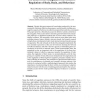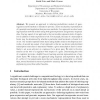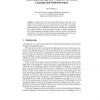600 search results - page 3 / 120 » The role of the striatum in adaptation learning: a computati... |
ATC
2009
Springer
14 years 2 months ago
2009
Springer
Abstract. An Organic Computing system has the ability to autonomously (re-)organize and adapt itself. Such a system exhibits so called self-x properties (e.g. self-healing) and is ...
CONNECTION
2010
13 years 4 months ago
2010
Abstract. Despite the great amount of knowledge produced by the neuroscientific literature affective phenomena, current models tackling noncognitive aspects of behavior are often b...
RECOMB
2004
Springer
14 years 7 months ago
2004
Springer
Abstract. We present an approach to inferring probabilistic models of generegulatory networks that is intended to provide a more mechanistic representation of transcriptional regul...
ICWL
2009
Springer
13 years 5 months ago
2009
Springer
Abstract. Learning style is one of the individual differences that play an important but controversial role in the learning process. This paper aims at providing a critical analysi...
ICDM
2008
IEEE
14 years 1 months ago
2008
IEEE
We present a classification algorithm built on our adaptation of the Generalized Lotka-Volterra model, well-known in mathematical ecology. The training algorithm itself consists ...



